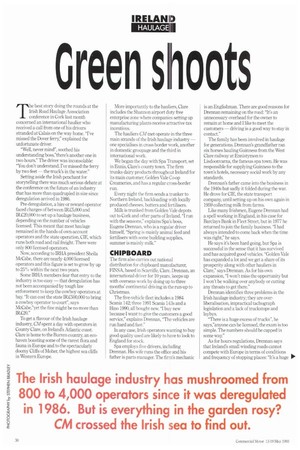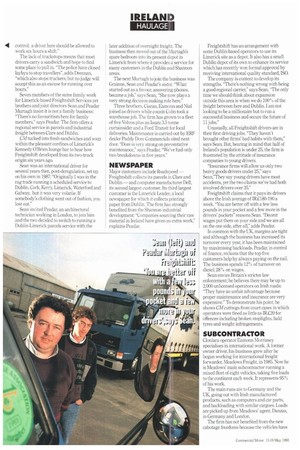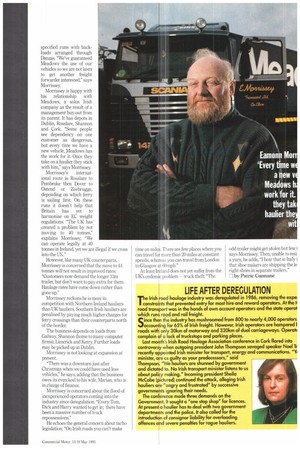Green shoots
Page 32

Page 34

Page 35

If you've noticed an error in this article please click here to report it so we can fix it.
The best story doing the rounds at the Irish Road Haulage Association conference in Cork last month concerned an international haulier who received a call from one of his drivers stranded at Calais on the way home. "I've missed the Dover ferry" explained the unfortunate driver.
"Well, never mind", soothed his understanding bo,ss,"there's another one in two hours" The driver was inconsolable: "You don't understand. I've missed the ferry by two feet — the truck's in the water."
Setting aside the Irish penchant for storytelling there was much serious debate at the conference on the future of an industry that has more than quadrupled in size since deregulation arrived in 1986.
Pre-deregulation, a hire or reward operator faced charges of between I113,000 and IRE20,000 to set up a haulage business, depending on the number of vehicles licensed. This meant that most haulage remained in the hands of own-account operators and the state operation, CIE, which runs both road and rail freight. There were only 800 licensed operators.
Now, according to IRHA president Sheila McCabe, there are nearly 4,000 licensed operators and this figure is set to grow by up to 25°0 within the next two years.
Some [BHA members fear that entry to the industry is too easy — that deregulation has not been accompanied by tough law enforcement to keep the cowboy operators at bay. "It can cost the state IRL500,000 to bring a cowboy operator to court", says NIcCabe,"yet the fine might be no more than IR..£20."
To get a flavour of the Irish haulage industry, CM spent a day with operators in County Clare, on Ireland's Atlantic coast. Clare is home to the Burren country, an ecohaven boasting some of the rarest flora and fauna in Europe and to the spectacularly doomy Cliffs of Moher, the highest sea cliffs in Western Europe.
More importantly to the hauliers, Clare includes the Shannon airport duty free enterprise zone where companies setting up manufacturing plants receive am-active tax incentives.
The hauliers CM met operate in the three main strands of the Irish haulage industry — one specialises in crossborder work, another in domestic groupage and the third in international work.
We began the day with Spa Transport, set in Ennis, Clare's county town. The firm trunks dairy products throughout Ireland for its main customer, Golden Vale Co-op Creameries, and has a regular cross-border run.
Every night the firm sends a trunker to Northern Ireland. backloading with locally produced cheeses, butters and fertilisers.
Milk is trunked from Golden Vale depots out to Cork and other parts of Ireland. "I run with the seasons," explains Spa's boss, Eugene Drennan, who is a regular driver himself, "Spring is mainly animal feed and fertilisers with some building supplies, summer is mainly milk."
CHIPBOARD
The firm also carries out national distribution for chipboard manufacturer, FINSA, based in Scarriffe, Clare. Drennan, an international driver for 10 years, keeps up with overseas work by doing up to three months' continental driving in the run-up to Christmas The five-vehicle fleet includes a 1984 Scania 142; three 1991 Scania 143s and a Hino 1990, all bought new. "I buy new because I want to give the customers a good service," explains Drennan, "The vehicles are run hard and fast."
In any case, Irish operators wanting to buy good quality used are likely to have to look to England for stock.
Spa employs five drivers, including Drennan. His wife runs the office and his father is parts manager. The firm's mechanic is an Englishman. There are good reasons for Drennan remaining on the road: "It's an unnecessary overhead for the ow-ner to remain at home and I like to meet the customers — driving is a good way to stay in contact."
The family has been involved in haulage for generations. Drennan's grandfather ran six horses hauling Guinness from the West Clare railway at Ennistymon to Lisdoonvarna, the famous spa town. He was responsible for supplying Guinness to the town's hotels, necessary social work by any standards.
Drennan's father came into the business in the 1940s but sadly it folded during the war. He drove for CIE, the state transport company, until setting up on his own again in 1959 collecting milk from farms.
Like many Irishmen, Eugene Drennan had a spell working in England. in his case for Barclays Bank in Fleet Street, but in 1977 he returned to join the family business. "I had always intended to come back when the time was right," he says.
He says it's been hard going, but Spa is successful in the sense that it has survived and has acquired good vehicles "Golden Vale has expanded a lot and we get a share of its prosperity along with other hauliers in Clare," says Drennan. As for his own expansion, "I won't miss the opportunity but I won't be walking over anybody or cutting any throats to get there."
Drennan identifies three problems in the Irish haulage industry; they are overliberalisation, impractical tachograph legislation and a lack of truckstops and laybys "There is a huge excess of trucks", he says,"anyone can be licensed, the exam is too simple. The numbers should be capped in some way"
As for hours regulations, Drennan says that Ireland's small winding roads cannot compete with Europe in terms of conditions and frequency of stopping places: "It's a huge 1111"
control; a driver here should be allowed to work six hours a shift' The lack of truckstops means that most drivers carry a sandwich and hope to find some place to pull in. "The police have closed laybys to stop travellers", adds Drennan, "which also stops truckers, but no judge will accept this as an excuse for running over hours."
Seven members of the same family work for Limericlobased Freightshift Services yet brothers and joint directors Sean and Peadar Murtagh insist it is not a family business: "There's no favouritism here for family members," says Peadar. The firm offers a regional service in parcels and industrial freight between Clare and Dublin.
CM tucked into fresh sandwiches and soup within the pleasant confines of Limerick's Kennedy O'Brien lounge bar to hear how Freightshift developed from its two-truck origin six years ago.
Sean was an international driver for several years then, post-deregulation, set up on his own in 1987: "Originally I was in the rag trade running a scheduled service to Dublin, Cork, Kerry, Limerick, Waterford and Galway, but it was very volatile. If somebody's clothing went out of fashion, you lost out."
Sean invited Peadar, an architectural technician working in London, to join him and the two decided to switch to running a Dublin-Limerick parcels service with the later addition of overnight freight. The business then moved out of the Murtagh's spare bedroom into its present depot in Limerick from where it provides a service for many customers in the Dublin and Shannon areas.
The next Murtagli to join the business was Grainne, Sean and Peadar's sister. "What started out as a favour, answering phones, became a job," says Sean, "She now plays a ver3, strong decision making role here."
Three brothers. Ciaran, Eamonn and Nial joined as drivers while cousin CoIm took a warehouse job. The firm has grown to a fleet of five Volvos plus an Isuzu 3.5 tonne curtainsider and a Ford Transit for local deliveries. Maintenance is carried out by ERE dealer Paddy Dore Commercials sited next door. "Dore is very strong on preventative maintenance," says Peadar, "We've had only two breakdowns in five years."
Major customers include Roadspeed Freightshift collects its parcels in Clare and Dublin — and computer manufacturer Dell, its second largest customer. Its third largest customer is the Limerick Leader, a local newspaper for which it collects printing paper from Dublin. The firm has strongly benefited from the Shannon industrial development: "Companies sourcing their raw material in Ireland have given us extra work," explains Peadar. Freightshift has an arrangement with some Dublin-based operators to use its Limerick site as a depot, It also has a small Dublin depot of its own to enhance its service which has recently won formal approval by receiving international quality standard, ISO.
The company is content to develop its strengths. "There's nothing wrong with being a good regional carrier," says Sean, "The only time we should think about expansion outside this area is when we do 100% of the freight between here and Dublin. I am not looking to be a millionaire but to run a successful business and secure the future of 11 jobs."
Unusually, all Freightshift drivers are in their first driving jobs. "They haven't brought other firms' bad habits with them," says Sean. But, bearing in mind that half of Ireland's population is under 25, the firm is frustrated by the attitude of insurance companies to young drivers.
"Insurance firms will allow us only two heavy goods drivers under 25," says Sean,"They say young drivers have most accidents, yet the two claims we've had both involved drivers over 35."
Freightshift claims that it pays its drivers above the Irish average of IR1 80-190 a week. "You are better off with a few less pounds in your pocket and a few more in the drivers' pockets" reasons Sean. "Decent wages put them on your side and we are all on the one side, after all," adds Peadar.
In common with the UK. margins are tight and although the business has increased its turnover every year, it has been maintained by maximising backioads. Peadar, in control of finance, reckons that the top five customers help by always paying on the nail. The business spends 12% of turnover on diesel; 28% on wages.
Sean envies Britain's stricter law enforcement; he believes there may be up to 2,000 unlicensed operators on Irish roads: They have an unfair advantage because proper maintenance and insurance are very expensive." To demonstrate his point, he shows ClIcutti ngs from court cases in which operators were fined as little as IR420 for offences including broken stoplights, bald tyres and weight infringements.
Clonlara operator Eamonn Morrissey specialises in international work. A former owner driver, his business grew after he began working for international freight forwarder, Meadows Freight, in 1985. Now he is Meadows' main subcontractor running a mixed fleet of eight vehicles, taking five loads to the continent each week. It represents 95% of his work.
The main runs are to Germany and the UK, going out with Irish manufactured products, such as computers and car parts, and backloading with similar cargoes. Loads are picked up from Meadows' agent, Danms, in Germany and London.
The firm has not benefited from the new cabotage freedoms because the vehicles have specified runs with back. loads arranged through Danzas. "We've guaranteed Meadows the use of our vehicles so we are not keen to get another freight forwarder interested," says Morrissey.
Morrissey is happy with his relationship with Meadows, a solus Irish company as the result of a management buy-out from its parent. It has depots in Dublin, Rosslare, Shannon and Cork. "Some people see dependency on one customer as dangerous, but every time we have a new vehicle, Meadows has the work for it. Once they take on a haulier they stick with him," says Morrissey.
Morrissey's international route is Rosslare to Pembroke then Dover to Ostend or Zeebrugge, depending on which ferry is sailing first. On these runs it doesn't help that Britain has yet to harmonise on EC weight regulations. "The UK has created a problem by not moving to 40 tonnes," explains Morrissey, "We
can operate legally at 40 tonnes in Ireland, yet we are illegal if we cross into the UK."
However, like many UK counterparts, Morrissey is concerned that the move to 44 tonnes will not result in improved rates: "Customers now demand the longer 13m trailer, but don't want to pay extra for them. Haulage rates have come down rather than gone up."
Morrissey reckons he is more in competition with Northern Ireland hauliers than UK hauliers. Southern Irish hauliers are penalised by paying much higher charges for ferry crossings than their counterparts north of the border.
The business depends on loads from Galway, Shannon (home to many computer firms), Limerick and Kerry. Further loads may be picked up in Dublin.
Morrissey is not looking at expansion at present.
"There was a downturn just after Christmas when we could have used less vehicles," he says, adding that the business owes its even keel to his wife, Marian, who is in charge of finance.
Morrissey is concerned about the flood of inexperienced operators coming into the industry since deregulation. "Every Tom, Dick and Harry wanted to get in there have been a massive number of truck repossessions" He echoes the general concern about tacho legislation: "On Irish roads you can't make
time on mileS. There are few places where you can travel for more than 20 miles at constant speeds, whereal, you can travel from London to Glasgow at 61hiph."
At least helm id does not yet suffer from the UK's endemic problem -truck theft: "The odd trailer might get stolen but few says Morrissey. Then, unable to resi a yarn, he adds, "I hear that in Italy i that shoe makers are shipping the le right shoes in separate trailers," 7i by Patric Cuirmane
































































































































